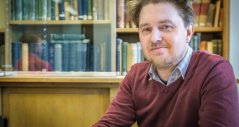
News
European grants of 2.5 million for WUR professors Liesje Mommer and Thijs Ettema
Fundamental science in ecology and microbiology at Wageningen University & Research is getting a boost through European subsidies. Professor of Belowground ecology Liesje Mommer and professor of Microbiology Thijs Ettema are receiving a personal ERC Advanced Grant, worth 2.5 million euros.
Every year, a number of established scientists with a leading role in their field and an idea for important, profound research, are eligible for an ERC Advanced Grant. This year, two Wageningen professors are receiving a 2.5-million-euro grant, made available for the next five years. ‘I am incredibly happy with this recognition of years of focus and hard work’, says professor of Belowground ecology Liesje Mommer, who leads the Wageningen Biodiversity Initiative (WBI). The ERC grant allows her to continue her fundamental research into disease ecology in plants.
Spread of diseases in crops

‘Ecosystems with a high degree of biodiversity are less susceptible to diseases’, says Mommer. ‘It is generally assumed that this is due to the wide variety in species, but that explanation doesn’t always hold water. We are investigating which combinations of plant properties result in lower disease spread. My focus is on the belowground properties of plants, such as root thickness and the presence of mycorrhiza fungi that cooperate with the plant. Those may also protect the plant against certain diseases.’
In the next five years, she will test 80 species of grasses and field plants, including daisies, poppies and clover. ‘This will yield fundamental insights into plants and the spread of diseases, which is of the utmost importance for agriculture’, Mommer continues. ‘I hope that, after this, I’ll be able to definitively state: if a farmer wants to grow certain crops, they would do well to include these other crops to lower the risk of disease. At this point, that’s still a process of trial and error, but I hope that, in the future, we’ll be able to offer substantiated advice based on the observed mechanisms.’
Rise of complex life
Thijs Ettema, chairholder of the Laboratory of Microbiology, will use the ERC grant to continue his research into the rise of complex life in the next five years. In 2013, he was awarded a Starting Grant by ERC, followed by a Consolidator Grant and now an Advanced Grant. ‘The latter is meant for long-term research. I think it’s wonderful that I can now make this next step’, Ettema says.

Earlier, Ettema discovered a group of single-celled organisms (Asgard archaea), the descendants of the organism that gave rise to all complex life on Earth. 2 billion years ago, this organism absorbed a bacteria, which later developed into an energy-producing organelle, the mitochondrion. After the discovery of Asgard archaea, Ettema mapped out the genetic composition of this group.
‘The next step is to try and grow this group of organisms in a lab in order to facilitate their study’, Ettema explains. ‘We hope to be able to find similarities with the cells of eukaryotes, the group we ourselves belong to, as do all plants, animals and fungi. That way, we’ll be able to better understand and reconstruct the rise of complex life on Earth. The world would have looked very different if this development hadn’t taken place. Lots of people want to know how life as we know it came to be. This is also evident from the National Research Agenda.’
Driven by curiosity
Ettema: ‘Purely curiosity-driven research is incredibly important. It does not only allow us to solve issues directly, but fundamental knowledge is also often at the root of practical inventions. Consider, for instance, the invention of CRISPR-Cas, in which WUR researchers played an important part. This breakthrough was preceded by years of fundamental research, but now, researchers all over the world use this technology and constantly expand its range of applications.’